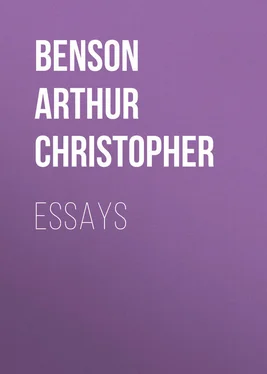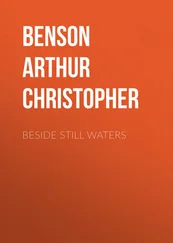Arthur Christopher Benson - Essays
Здесь есть возможность читать онлайн «Arthur Christopher Benson - Essays» — ознакомительный отрывок электронной книги совершенно бесплатно, а после прочтения отрывка купить полную версию. В некоторых случаях можно слушать аудио, скачать через торрент в формате fb2 и присутствует краткое содержание. ISBN: , Жанр: foreign_antique, foreign_prose, Историческая проза, на английском языке. Описание произведения, (предисловие) а так же отзывы посетителей доступны на портале библиотеки ЛибКат.
- Название:Essays
- Автор:
- Жанр:
- Год:неизвестен
- ISBN:http://www.gutenberg.org/ebooks/35860
- Рейтинг книги:3 / 5. Голосов: 1
-
Избранное:Добавить в избранное
- Отзывы:
-
Ваша оценка:
- 60
- 1
- 2
- 3
- 4
- 5
Essays: краткое содержание, описание и аннотация
Предлагаем к чтению аннотацию, описание, краткое содержание или предисловие (зависит от того, что написал сам автор книги «Essays»). Если вы не нашли необходимую информацию о книге — напишите в комментариях, мы постараемся отыскать её.
Essays — читать онлайн ознакомительный отрывок
Ниже представлен текст книги, разбитый по страницам. Система сохранения места последней прочитанной страницы, позволяет с удобством читать онлайн бесплатно книгу «Essays», без необходимости каждый раз заново искать на чём Вы остановились. Поставьте закладку, и сможете в любой момент перейти на страницу, на которой закончили чтение.
Интервал:
Закладка:
He wrote also to record this a long mystical poem, called Psychozoia (Life of the Soul), in 1640, at the age of twenty-six. He was flooded with a perpetual content.
In the pursuit of mysticism there are often several painful facts to record. In the first place, it is common to find a mystical temperament in those whose physical nature is not very strong or passionate. It seems as if certain natures, by the very fact that the ties which hold them to the earth are more than half-loosened already, have a strong affinity to the world of abstractions – as if the very weakness of their corporeal organisation held open a door through which strange shapes are seen moving, and airy voices heard to call; and again the mystical life is, more than any other, subject to deep depressions of spirit, dumb insensibilities, and heavy overshadowings from the towers of death. In the history of More's life no trace of either of these failings can be even faintly discovered. In the first place, he was of a strong and sound constitution; he did not know what it was to be languid or out of health; he was gifted with an extraordinary spring and plenty of pure animal spirits – "a rich ethereal sort of body, for what was inward," to use his own Pythagorean phrase; he says of himself that his body seemed built for a hundred years; that he had a high warmth and activity of thought that never flagged – notably too, that, after a long day of incessant thought, when he came to sleep he had a strange sort of narcotic power; and he was no sooner in a manner laid on his bed, that the falling of a house would scarce wake him, and that he woke in the morning to an inexpressible life and vigour, so that his thoughts and notions "rayed" about him.
There would seem to be little of the visionary here; and yet he confesses to a consciousness of what he calls "Enthusiasm" – which we should almost call madness: he could summon up a material object with such distinctness – visualise it, as it is now called – that it produced on him all the sensations of being seen with the outward eye: that is, he could at any moment, with his eyes open, command a scene or a person, so that the vision passed before and effaced the furniture of his room or the page of his book: and he says that all his life he could, with an almost inconsiderable effort of the will, fix his mind so intently on any subject or line of thought that he could spend as much as three hours in an intent uninterrupted reverie.
Such a man would be sure to fling himself with rapture into ascetic and mortifying practices – and so he did: the result was a prolonged exaltation of soul, apparently unaccompanied by any symptoms of exhaustion and depression, which is almost miraculous. One reverie, which he records, lasted for fifteen days, during which he slept and rose, ate and drank, went about his ordinary business, without, he asserts, any one suspecting that he was all the time occupied in a serene and rapturous contemplation. In this "lazy activity," he said, "he passed from notion to notion without any perceptible images or words in the mind;" as he walked in the street he could have fallen, he said, and kissed the stones for joy; when playing the theorbo, for he had considerable musical talent, he says that he sometimes became almost mad with pleasure – so overcome that he was forced to desist.
"I am not out of my wits [as he writes in a touching passage in one of his mystical dialogues] in this divine freedom, for God does not ride me as a horse, and guide me I know not whither, but converseth with me as a friend: I sport with the beasts of the earth; the lion licks my hand like a spaniel; the serpent sleeps upon my lap and stings me not. I play with the fowls of heaven, and the birds of air sit singing upon my fist. Thou canst call down the moon so near thee by thy magic charm that thou mayst kiss her, as she is said to have kissed Endymion – or control and stop the course of the sun; or, with one stamp of thy foot, stay the motion of the earth.
"He that is come hither, God hath taken him to be His own familiar friend; and though He speaks to others aloof off, in outward religions and parables, yet He leads this man by the hand, teaching him intelligible documents upon all the objects of His providence: speaks to him plainly in His own language, sweetly insinuates Himself and possesseth all his faculties, understanding, reason, and memory. This is the darling of God, and a prince among men, far above the dispensation of either miracle or prophet."
There is no figure in literature that comes very close to this, except the solemn form of Prospero in the enchanted land:
The isle is full of noises.
Sounds and sweet airs, that give delight and hurt not.
Henry More's life was a very simple one. His private means were large; we hear of his possessing the advowson of a living in Lincolnshire, Ingoldsby, to which he presented Mr. Ward, who wrote his life, and a large farm in the same county; he had also other sources of income. Thus he had no temptation to seek for wealth, or for preferment for the sake of wealth, since his tastes were extraordinarily simple. He did, as a matter of fact, give very largely in charity; his door, it was said, was like the door of an hospital; indeed, he was so liberal with his money, that in later life he made over to a nephew, Gabriel More, who had fallen into misfortunes through no fault of his own, not only his Lincolnshire estates, but a large legacy which he received from Lady Conway.
He was elected a Fellow of Christ's soon after taking his M.A. degree: his solitary and contemplative habits, his ascetic practices – for these, though not marked, were sure to be discussed in so small and intimate a society as a college – and the slight suspicion of fanaticism that he incurred, led some to doubt whether he would not be a melancholy addition to the Combination Room; but those who knew him better assured the authorities that, though he was studious and serious, yet he was a very pleasant companion, and in his way one of the merriest Greeks they were acquainted with.
He was offered several important posts. Great efforts were made to get him over to Ireland. On one occasion he was offered the Deanery of Christ Church, Dublin, and on another occasion the Provostship of Trinity College combined with the Deanery of St. Patrick's; as he never even considered these for a moment, he was offered two Irish Bishoprics in succession, the Lord-Lieutenant writing to him to press his acceptance of the latter. "Pray be not so morose or humoursome," he wrote, "as to refuse all things you have not known so long as Christ's College."
Once even he was offered an English Bishopric, and his friends got him as far as Whitehall to kiss hands, but they concealed the real object of their designs, and when he understood it, he was not on any account to be persuaded.
Late in life he accepted a prebend at Gloucester, urgently pressed on him by Heneage Finch, Earl of Nottingham, the Lord Chancellor, brother of an old pupil, but he resigned it almost immediately in favour of one of his friends; and once, too, the Fellows offered to elect him to the Mastership of Christ's, when it fell vacant, but this also he declined.
He was tutor of the College for a time, and was brought thus into close relations with Sir John Finch, afterwards Ambassador to Turkey, younger brother of Lord Nottingham, then an undergraduate. Finch's sister, Lady Conway, had been converted to the tenets of the Quakers, and Henry More, whose interest in his pupil extended itself to his pupil's sister, laboured to reclaim her for several years; he was thus brought into contact with Penn and the leaders of the Quietist party.
Lady Conway, the original of Lady Cardiff in "John Inglesant," was afflicted by mysterious and incurable pains in the head, and not only travelled to consult physicians, but was accustomed to assemble quacks and specialists in her house at Ragley; there More spent most of his time, and composed several books at her ladyship's special request. There, too, he met the faith-healer Greatrakes, a moody man who had lived for some time in seclusion at his own ruined castle of Capperquin in Ireland; as well as the famous Van Helmont, Baron of Austria, Quaker and physician, son of the famous chemist of the same name. This man was all that Greatrakes was not; he had considerable medical skill, and a quiet pious character. To us the union of the preacher and physician is somewhat repugnant. We take it to mean that a man supplies the gaps in his practical knowledge by the pretensions of spiritual insight; we believe him to be proficient in neither. Van Helmont, however, seems to have been a genuine man, and to suffer from an undeserved contempt. As a matter of fact the possession of keen moral insight and sympathy is one of the most powerful instruments that a physician can claim; the physical and mental constitution react so invariably, that without it a man must be at a loss; the healing art need not necessarily halt at the threshold of hypochondria.
Читать дальшеИнтервал:
Закладка:
Похожие книги на «Essays»
Представляем Вашему вниманию похожие книги на «Essays» списком для выбора. Мы отобрали схожую по названию и смыслу литературу в надежде предоставить читателям больше вариантов отыскать новые, интересные, ещё непрочитанные произведения.
Обсуждение, отзывы о книге «Essays» и просто собственные мнения читателей. Оставьте ваши комментарии, напишите, что Вы думаете о произведении, его смысле или главных героях. Укажите что конкретно понравилось, а что нет, и почему Вы так считаете.












